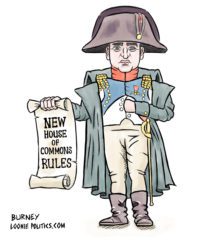Upon her return to the House of Commons after the Easter break, Government House Leader Bardish Chagger signalled her willingness to back down on some of the most egregious of her proposed changes to the Standing Orders in particular, the ideas around using scheduling motions to get legislation passed, but over the course of this, signalled that more time allocation was likely necessary. She also signalled that they were moving ahead with certain other proposals those enumerated in the party's election platform and the howls of the opposition parties began anew.
"They're changing the rules for ever and ever," complained Conservative House Leader Candice Bergen to reporters in the Foyer after Chagger made her own statement, and this was the first time that day that my head exploded. It would do so again several times over the subsequent hours, and my patience for this particular clown show has long since reached its end.
Every side in this dispute is wrong. Bardish Chagger's ham-fisted insistence that these changes are necessary to "modernize" the House of Commons and its practices are unfounded and she is looking to create a number of problems where they don't exist currently. As with a number of the promises they made during the last election when it comes to democratic reform, these are a number problems designed to appeal to those tired of Conservative abuses that only serve to make things worse if realized rather than better. The opposition, meanwhile, is misfiring blindly, scoring a number of own-goals with their childish behaviour, apocalyptic rhetoric, and outright hypocrisy in the way they characterize the current government's behaviour when compared to that of the Conservatives, not to mention the fact that they have yet to walk their own talk when it comes to doing things like showing up on Fridays, or having their leaders there for QP even four days a week, let alone five.
Part of the problem is that there are no reasonable actors in this dispute. The government is rushing blindly ahead because of this foolish promise, and they have this particularly demented notion that the solution to the problems that do exist in our parliament are to simply create more rules. The Conservatives, having spent the better part of a decade abusing those very rules have no credibility in opposing the changes that Chagger proposes on the backs of those very abuses, and so they rely on torqued talking points and gross mischaracterizations to try and sell their message. The NDP, meanwhile, alternate between unctuous sanctimony as the party that has never been in power, and being the worst offenders when it comes to the kinds of ceaseless empty speechifying that now dominates what passes for debate in the Commons.
Another big part of the problem with Chagger's approach with the creation of yet more rules is that there is a real danger when it comes to codifying conventions in our parliament. We've seen this show play out before, especially with the issue of speechifying. It used to be that there was no time limit to speeches, and when that got abused, they put a limit of forty minutes to speeches. Instead of using that as an upper limit, MPs started feeling the need to fill that time, and when the limit was changed to twenty minutes, with a further ten minutes for questions and answers, the impulse to fill that time with prepared speeches ossified.
That's not to say that some of what Chagger proposes is entirely without merit empowering the Speaker to break up omnibus bills is not a bad thing. If they can get the Speaker to sanction members during Question Period, and to loosen that time clock, it wouldn't be such a bad thing either, and there's no reason why these changes couldn't be done with the cooperation of the other parties. Reforming the Estimates process as the government has planned to do is a long overdue change that needs to happen, but it shouldn't be done in the Hulk-like manner that Chagger is going about this.
But one of the complaints of the opposition parties, that changing the Standing Orders to ensure that the prime minister answers all questions during one QP every week, is where the problems will start, in that it will have the perverse incentive to encourage the current or future PM to only do the bare minimum of showing up just that one day a week. Currently there are no rules about the PM's attendance or obligations in QP, which is the way it should be. As with speaking times, this will create an expectation rather than solve a problem, which is part of the problem with creating new rules to combat past abuses. You can't mandate honourable behavior with a rulebook, and creating new rules will just give future governments an incentive to find new ways to circumvent them, continuing the vicious cycle.
One of Chagger's other problematic talking points is that these changes are about holding future governments to account, which is mind-blowingly problematic because that's not her job. Her job is to manage the day-to-day flow of legislation in this parliament, and she's not doing a very good job of it right now, allowing this particular debate to derail that. Not to mention, any changes she makes in this parliament, a future parliament can undo or change again to suit their own whims. She may as well try fighting the wind.
The deeper problems of the rotted debating culture in our parliament won't be solved with yet more rules. In fact, undoing previous rule changes will do more to reverse the damage than simply trying to one-up each other in who can make a more "modern" parliament. Restoring our proper Westminster traditions, which includes actual debate without prepared speeches, and returning power to the Speaker to police it, is the only way that we can hope to fix what ails our parliament. But none of the parties in this fight are making that point, and if Chagger continues to bully her proposals through, we'll be far worse off than before.








